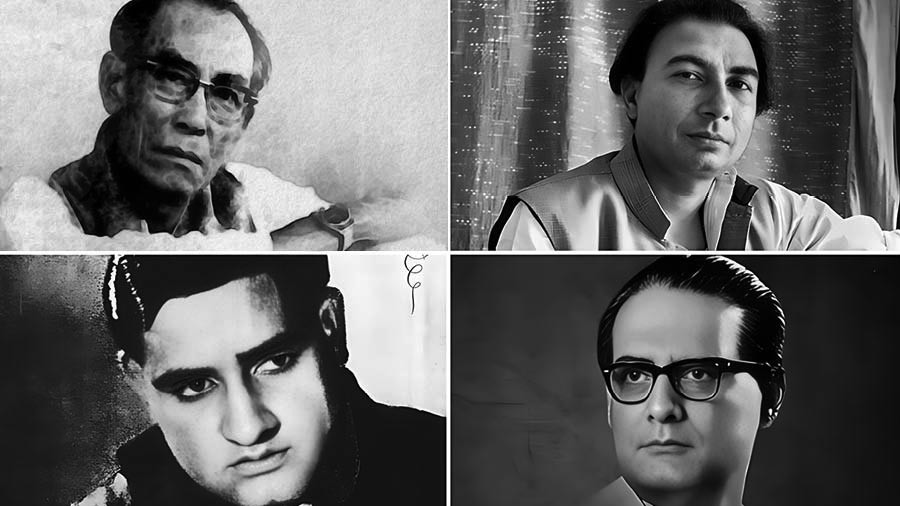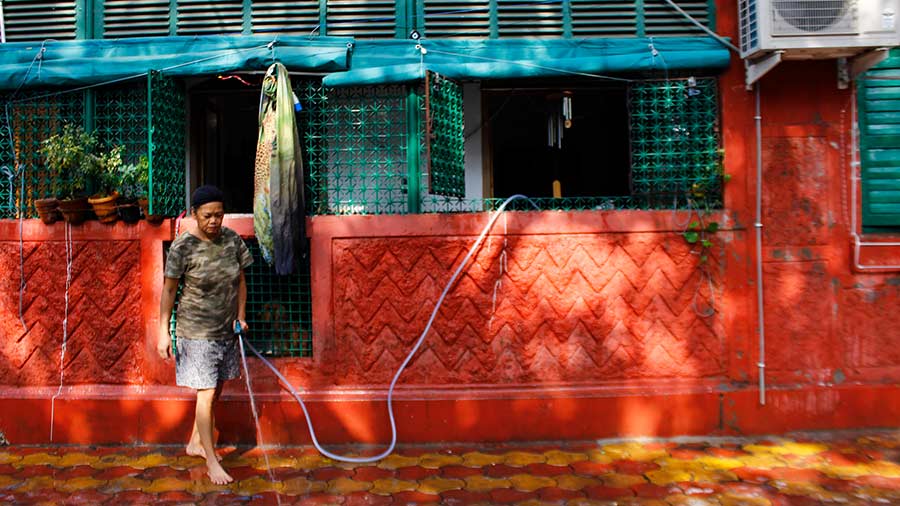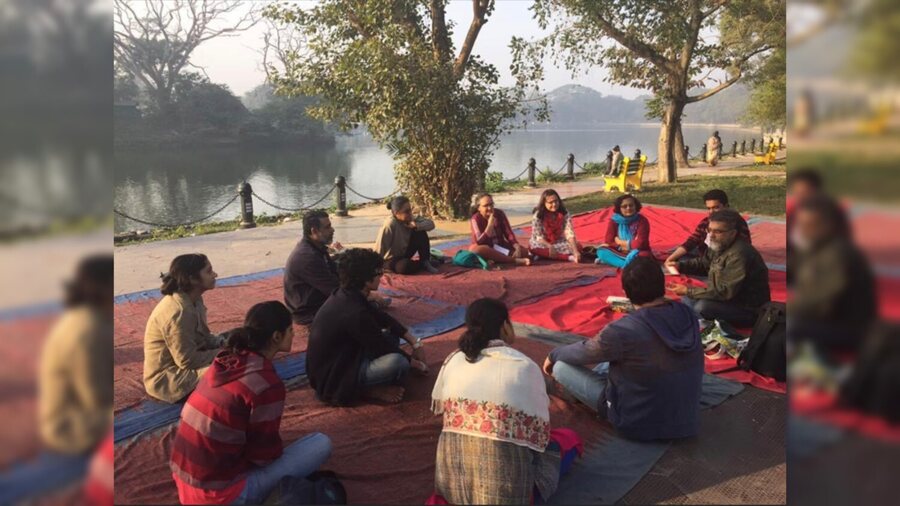Which is the first song that I remember?
Answer: Chakkay pe chakka, chakke pe gaadi from the first film I saw — Brahmachari. I was six when I passed the home test of whether I was eligible; off I was taken to Hind Cinema (on Ganesh Chandra Avenue in Kolkata) with a chocolate bar as a prize of sorts. It would be years before I recognised the play of words by Shailendra: “Thode agaadi, thode pichhadi…”
Which song is my life philosophy?
Answer: Main zindagi ka saath nibhaata chala gaya, written by my murshid Sahir Ludhianvi. This is not a song. It is life’s philosophy in eight lines. That’s right. Just eight lines. I created a sequence of eight visiting cards for myself in eight colours with each line at the bottom of the card. The visiting cards have become a collector’s item among the managing directors and chief financial officers that I am occasionally required to pitch my services to. They spend the first 75 seconds looking at the card, examining the fine print, turning the cards over, after which their first question is “When can we begin?” There is one line within the song that I quote during a bear market when there is blood on the streets: “Jo mil gaya usi ko muqaddar samajh liya. Jo kho gaya main usko bhulaata chala gaya.”
Which one song is a part of my collective family memory?
Which one song is a part of my collective family memory? Answer: Jab gham-e-ishq sataata hai to hans leta hoon. When this song would be aired on Chhaya Geet (All India Radio) after 10 pm, the family would experience a transistor-pull; my father would sit cross-legged near the transistor, listen initially and then drown Mukesh out by the second half of the song; when I listen to this piece today — 20 years after his exit — I sing with him in mind. We are at the two ends of time connected by Mukesh and Nyaya Sharma (who would have guessed?).
What is the one song I associate with the start of the day?
Answer: Karoon kya aas niraas bhaee by K.L. Saigal because it would inevitably be played on Radio Ceylon at 7.55 am (or some other Saigal song). That was Radio Ceylon’s way of paying tribute, quite like putting ‘10’ on the back of every football hero’s shirt. We would be sitting around the breakfast thaal dissecting an omelette, when the Saigal baritone would float through our bedroom. The 7.56 am on the clock, the morning light, the red of the toaster filaments, a half-eaten egg and mom asking, “One more?” Then Saigal would cut through all this with his “Hnaah hnaannh huh haan” prelude. The morning thaal conversation would freeze — dad’s palm at a right angle was a morse for ‘Not a word!’ — and he would be transported to Surat of the late 1940s. I picked all my Saigals courtesy that palm diktat.
What song would I associate with the end of my day?
Answer: One of our last evening memories would be “Chhaya Geet me Gabban Mirza ka aadaab”. When I heard this, I would leap off the zameen where one would be preparing to sleep, send out a hurried summons to the family: “Gabban Mirzaaaaah!” In the next 15 seconds, an embroidery work-in-progress would be dropped, the TV volume would be turned leftwards, and clerical account book balancing suspended. Gabban Mirza was saheb-e-class in our middle-class existence. He would float a genteel old world into our evening consciousness that would be all about tehzeeb, talaffuz and Talat.
Which song would I associate with my father?
Answer: Apart from the Jab gham-e-ishq song, anything by Hemant Kumar. Anything. Hemant Kumar wasn’t just a singer in the Patherya household, he was a cult. If dad were asked to sing at a club function, it would be Hemant. If any voice was the first to come out of the gramophone box, it would be Hemant. I grew up thinking that if a paanch-waqt-ka namaazi could worship a chain smoker then there must be some mystical raaz. I did likewise. And that is how came to be ushered into the haunting world of Yeh nayan dare dare, and Jaane woh kaise log the jinke and Darshan do ghanshyaam naath mori (well before Slumdug Millionaire). If only my father would have known that one day I would live nine buildings from where HK breathed his last, he would have clutched his beard and said: “Emmm?” (Is that so?)
Which song would I associate with my mother?
Answer: On the only occasion she was asked (tragedy, isn’t it?), she replied: Kitna badal gaya insaan. This morning, I Googled to find that the film Naastik had been released when mom was 18 and this all-important question had to wait another 25 years before being asked. I could have said “Mom, what an old-fashioned song!” but today, I recognise that she had seen the world transform from a relaxed pre-partitioned khuloos to a congested power-cut-marked Kolkata.
Which song would I associate with my children?
Answer: The song I associate with my daughter (now 26) is Koi mere dil me khushi ban ke aaya for the subsequent line: “Andhera tha ghar raushni ban ke aaya.” When she was born in 1995, she was handed to me outside the Woodlands operating theatre. The Majrooh imagery of darkness and light dawned. I reached for the hanky.
Which song would I associate with my childhood?
Answer: Tere mere sapne ab ek hi rang hai. I heard this song wafting out of the Bow Barracks neighbourhood where we would be dispatched with a maid and some caution (to not engage with ‘other’ kids). I was five. Nothing happened during that excursion except that this song from someone’s over-volumed transistor made a place in my consciousness. Fifty-five years later that random memory reminds me of a world where people spoke in soft manners, when we could walk into the homes of neighbours without WhatsApping an alert and virtually everyone we knew from Surat in Kolkata lived within a 2km radius. Or maybe I am just over-imagining the rose and the tinted glasses. Blame SD (Dada) Burman.
Which song would I associate most with my happiest memories?
Answer: Khushi ki woh raat aa gayi, koi geet sajne do for the curious reason that the first word of the song is ‘Khushi.’ Sung with jigar. The other song that connects with this emotion is Raja ki aayegi baaraat that I often find myself humming when there is no one around. Sung with emotion. There are some songs hooked on the peg of one’s mind for no specific reason — except one word.
Which song makes me tearful each time I hear it?
Answer: There are quite a few but the sardaar of this genre is Babul ki duaaeyn leti jaa. Especially when Sahir comes to “Bachpan me jhulaaya hai tujhko baaho ne meri jhoolon ki tarah.” This song is a good test of vocal stability. Mine.
Which song deepens nostalgia for the country (which is kind of corny because I haven’t left)?
Answer: Ai mere pyaare watan, a fusion of Salil, Manna Dey, Prem Dhawan, Balraj Sahni, Tagore and the image of an immigrant Kabuliwala. No song comes close. The magic line is towards the bottom: “Hum jahaan paida huay us jagah hi nikle dum…” Wishlist. Given the way things are going.
Which song qualifies as a personal anthem?
Answer: Kisi ki muskuraahato pe ho nisaar. We sung this song at the end of one of our Gupta parivaar shaadis (my in-laws) a decade-and-a-half ago and it has since become a tradition. Each time we congregate, we get a group picture done by anyone who owns a wide angle and then we invoke Shailendra full-throated. Even Gen X within the family gets it.
Which song do I find the most patriotic?
Answer: There is a tie. Between Main yeh soch kar uske dar se utha tha and Kar chale hum fida (both Kaifi chacha). There is one line in the second song that I repeat each time it is sung (upsetting the musical momentum): “Zinda rehne ke mausam bahut hain magar, jaan dene ki rut roz aati nahi.” Each Republic Day, we have a tradition within the family. My ‘saadu’ (co-brother-in-law, if such a term even exists) Sanjeev Bansal calls from Jakarta, singing the first few lines of any watan-parast song and I reciprocate. We don’t speak on the call as much as we sing.
Which song would I sing for its words more than for its music?
Answer: Yeh duniya agar mil bhi jaaye to kya hain. I would like to think that SD (Dada) Burman read the lyrics and said: “Haal-fil (he meant fil-haal) is pe kum dhun baithega” and under-scored. Sahir speaks to me. He is persuading. He is arguing. He is convincing. The song remains aspirational in a world where we sing evening mehfils with idealistic jazba and scurry to market rat-race when the first trades come in at 9.15 the next morning.
Which song creates that saddeningly yearning feeling?
Answer: Jaane kahaan gaye who din. Especially that line “Kehte the teri raah me nazron ko hum bichhayenge”. Precisely the kind of Shailendra-ised imagery that other languages would find difficult to match. Try explaining this to a naa-waaqif (unacquainted). “Nazron ko hum bichhayenge.” How would one even explain it literally without making the shaayar and the song sound ridiculous? But coming back to the effect… Shailendra has emptied the ‘dard’ of an ocean into a teacup.
Which song would I sing for the music more than for the words?
Answer: There are hazaar such songs, but I would put Arijit’s Phir mohabbat karne chalaa hai tu — bedroom voice, good music but pedestrian lyrics. Same goes for Phir le aaya dil by Rekha Bhardwaj; the voice and soothingness of the song rises far above the words. Last morning, I sang Aana meri (pronounced ‘merry’) jaan, meri jaan, Sunday ke Sunday’ at 6.38 am and the disoriented wife mumbled, “Again you’ve started?”
Which song moves me to a higher life purpose?
Answer: Shailendra’s Mausam beeta jaaye tuned by Salil Chowdhury from Do Bigha Zameen. Each time I hum “Kaun kahe is or tu phir aaye na aaye”, I must flip down the laptop, take the glasses off and add: “Dharti kahe pukaar ke, beej bichha le pyaar ke, mausam beeta jaaye.” I get a back-of-the-neck neural surge that triggers the echo of a timeless spiritual where an hour is but a flicker in the candle of time.
Which songs make me want to dance?
Answer: Ai meri zohrajabeen. The other one that comes close is Yaari hai imaan mera yaar meri zindagi. Fancy one song or dance making you a fan of the dancer (not Cuckoo, not Helen, not Madhuri but Pran Sikand). Whenever I need a mood shift, I turn to this on YouTube. I am not an expert on musicology but if there is something called ‘perfection’, then it is this synchronisation between music, words and movement.
Which song works like a mood shifter for me?
Answer: Vivaldi’s Four Seasons. The composition gives me hope. It makes my heart want to spring and embrace the world. It doesn’t soothe (for that there are other compositions); it makes me — as I said — want to leap. Leap, that is the word. Imagine a composition provoking an outcome as precise as this.
Which song is distinctively ‘Calcutta’?
Answer: Tummmmm pukaaaaaaar lo resonating off a lonely dim-lit north Kolkata bylane after a 10pm drizzle. Shyampukur Street. Shyambazar Street. Akrur Dutta Lane. Any. Narrow lanes, homes cheek by jowl and where you can hear a neighbour sneeze. Hemanta’s baritone is the seductress inside Calcutta. You may leave the city. The city will never leave you.
Which song recalls one specific member of my family?
Answer: Chhupa lo yun dil me pyar mera by Hemant Kumar and Lata Mangeshkar. The softness of the song evokes the vision of a non-electricity Shiv temple (preferably terracotta) in a distant village with a flickering diya. The fact that both — husband and wife — can sing this song without going off tune is also one of the reasons why this is on the top of our charts. The second reason is the vibration of the periodic cymbal. Then there is Lata piercing the stillness of the night. I bow to Roshan.
Which song has been the most under-rated (for popularity or impact) in my book?
Answer: Saavan aaye ya na aaye by Asha Bhonsle from Dil Diya Dard Liya, tuned by the maestro Naushad. Or Phir teri kahaan yaad aayi. Or Kashti ka khaamosh safar hai by Kishore Kumar. Nobody sings these songs at evening get-togethers. When I did once recently, the hostess said “Kuch naya ho jaaye?”
Which song gives me a near-paranormal feeling?
Answer: Om shanti om, when played at a high volume. I once heard this in a car with the windows rolled up and found myself tuned into a different wavelength (when I realised that such things exist). With each stage of the song, there is a rising connection with a larger reality that the conscious mind is unable to decode. This is where it gets strange: the film is about this as well.
Which song in my opinion will be sung 100 years from now?
Answer: There are so many here. Mera joota hai Japani, Awara hoon, Allah tero naam and Humko mann ki shakti dena come immediately to mind. I am not exploring further.
Which song is intrinsically Indian?
Answer: Chalat musaafir moh liya re pinjre waali muniya, Hothon pe sachchai rehti hai and Rang barse bheege chunar-waali rang barse. I have noticed that whenever the first song is sung, even the most inactive in our group has leaned forward and begun to rock; the slightly more active have reached out for the nearest table to become fleeting Zakir Hussains. Or when Amitabh pauses after “Launga ilaachi ka…” even the absent-minded drop what they may be doing, roll their eyes and turn to the nearest person with “Launga ilaachi ka bhai?”
Now the last question. Which song would I want played during my funeral?
Answer: Yeh duniya usi ki zamaana usi ka, written by the great S.H. Bihari. If indeed the baithak is going to discuss me in absentia, then I would want refined zubaan to be its currency: “Barbaad hona jiski adaa ho, dard-e-mohabbat jiski davaa ho. Sataayega kya gham usay zindagi ka, mohabbat me jo ho gaya ho kisi ka.” If someone can sing, someone can sax and someone sashay, what a memorable memorial service that would be. Who knows, I might drop in as well.


